Elevate your breakfast (or brunch) game with my favorite brioche French toast recipe! This recipe feels and tastes fancy, but it’s just as easy as its classic counterpart. Don’t miss the “secret” ingredient for the BEST flavor!
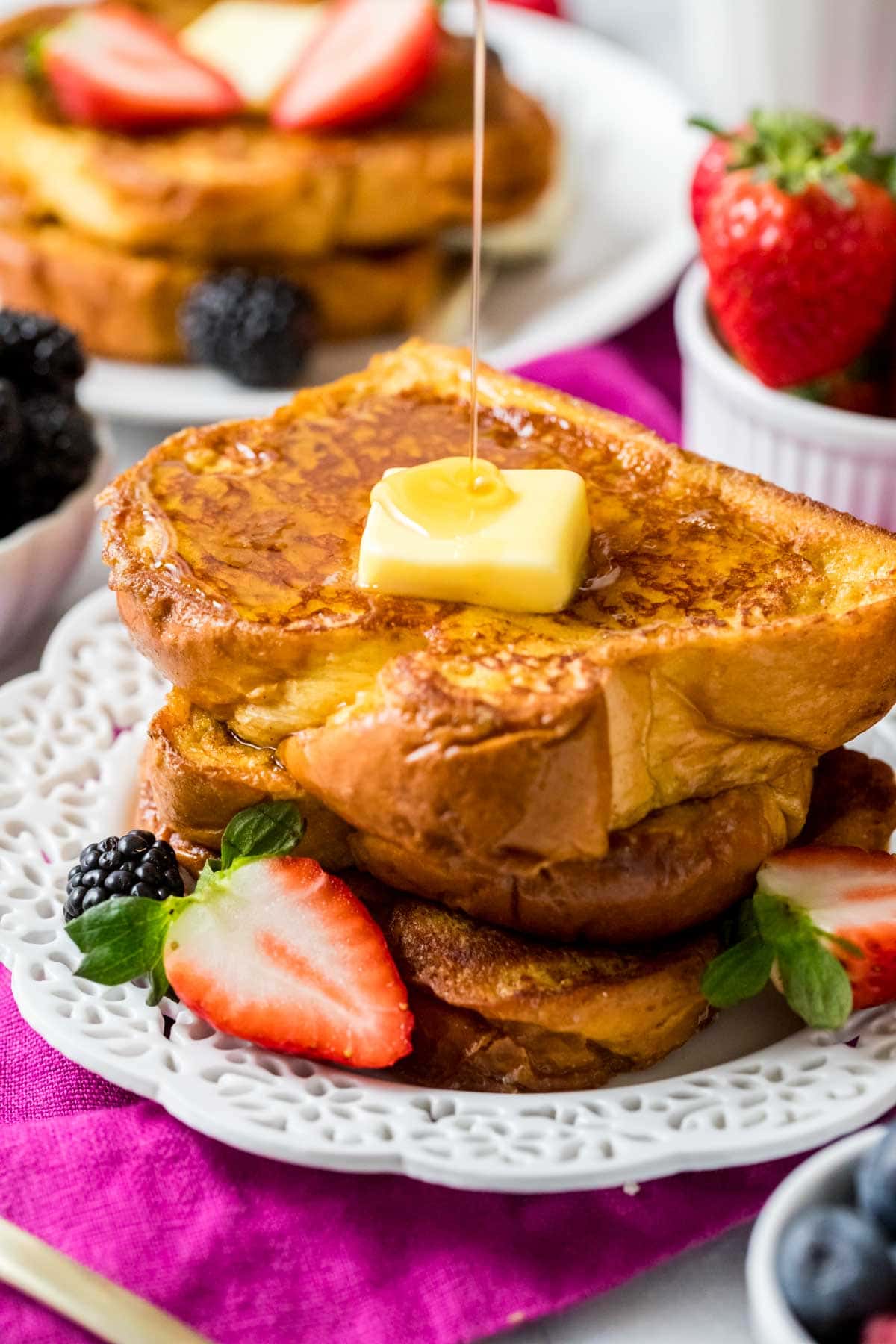
Fancy French Toast
From now on, I want all of my future French toasts to be brioche French toast. One bite will turn you into a French toast snob too; my version has truly gourmet flavor, a subtly caramelized and step-above-classic French toast exterior, and a moist, never soggy interior.
This recipe is adapted from my classic French toast recipe. You can, of course, use brioche for that recipe just as well as regular white bread, but I really like this modified recipe specifically for using with such an enriched bread (this egg mixture absorbs into the brioche very well).
Why You’ll Love This Recipe
- Requires the same amount of effort as regular French toast, but produces gourmet results.
- Orange zest adds a new, unexpected, but so fitting dimension of flavor that’ll have you going for seconds.
- Simple, but great for dressing up. This recipe tastes great on its own, but it can also be enhanced with raspberry sauce, homemade whipped cream, or macerated strawberries.
- Carefully outlined technique for slices that are always perfectly cooked and never soggy.
What You Need
With two key exceptions, the ingredients list will look much like what you’d probably expect for any old French toast recipe (but this isn’t just any old recipe).
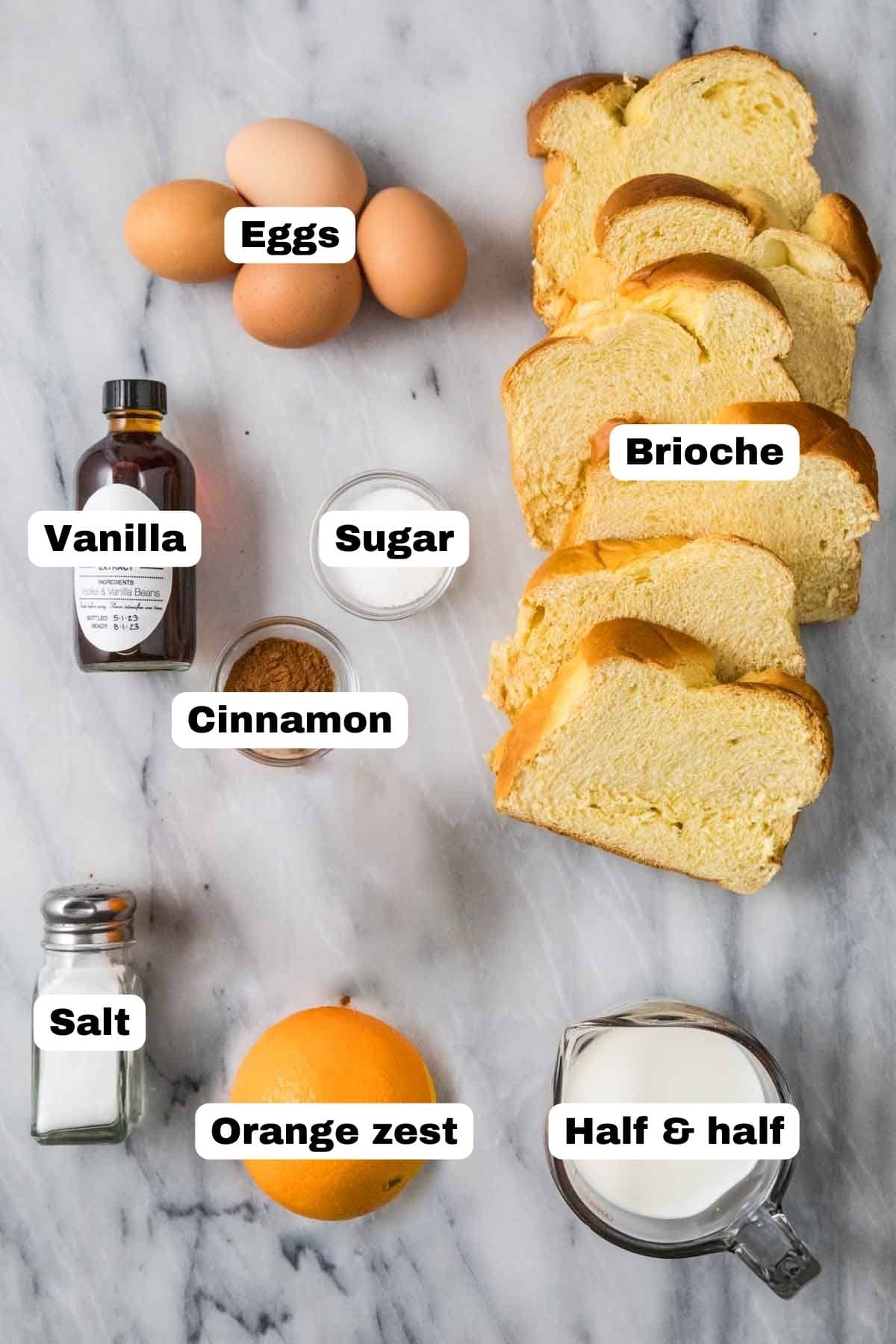
- Brioche bread. Brioche is an enriched bread, and it works beautifully for French toast. If you can’t find brioche, then you could use a similar enriched bread like challah or milk bread. Make sure to slice yours nice and thick, at least 1″ (2.5cm) will give you a nice hearty slab that appropriately can absorb the custard.
- Eggs. You’ll need 4 large eggs which we’ll whisk with the rest of the ingredients. Since you’ll be combining these with cold dairy, it’s fine if you use eggs straight out of the fridge (rather than room temperature, which I recommend with so many other recipes).
- Half and half. Paired with the eggs, this forms our custard base. If you don’t have half and half, you can substitute equal parts milk and heavy cream.
- Vanilla. A splash rounds out the flavor of our custard. Homemade vanilla extract would work great here!
- Orange zest. This ingredient is absent from classic French toast, but I found it elevates the flavor and makes this brioche french toast taste gourmet (fitting for such a rich bread). You *could* skip this if you really want to, but I recommend trying it at least once!
SAM’S TIP: If you really want to get fancy with this recipe, add a splash of almond extract to the custard. It will pair beautifully with the orange zest!
This is just an overview of the ingredients I used and why. For the full recipe please scroll down to the bottom of the post!
How to Make Brioche French Toast
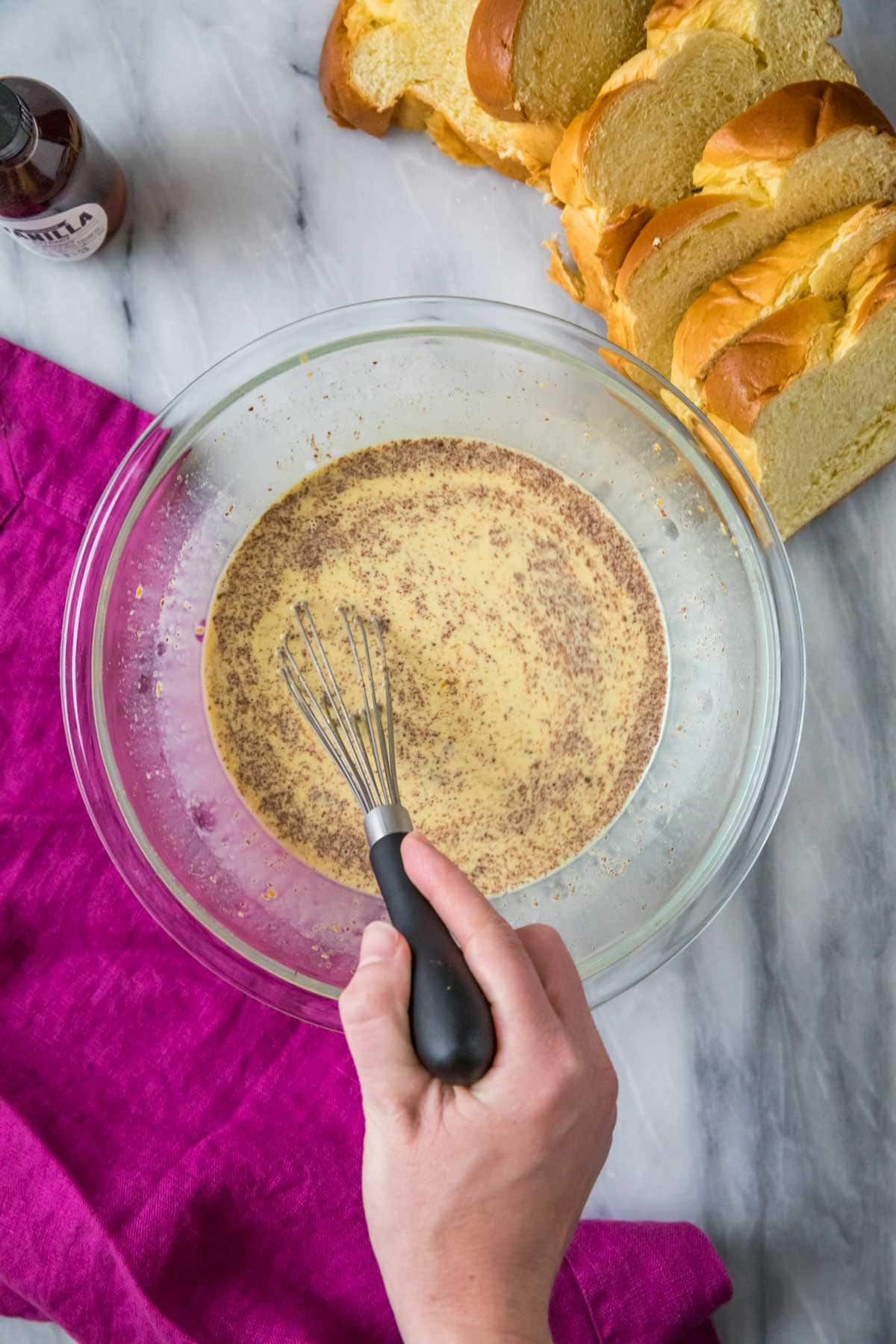
- Whisk together the custard ingredients in a large bowl. Make sure to break up the eggs so they are evenly incorporated. Set this aside while you heat up your pan.
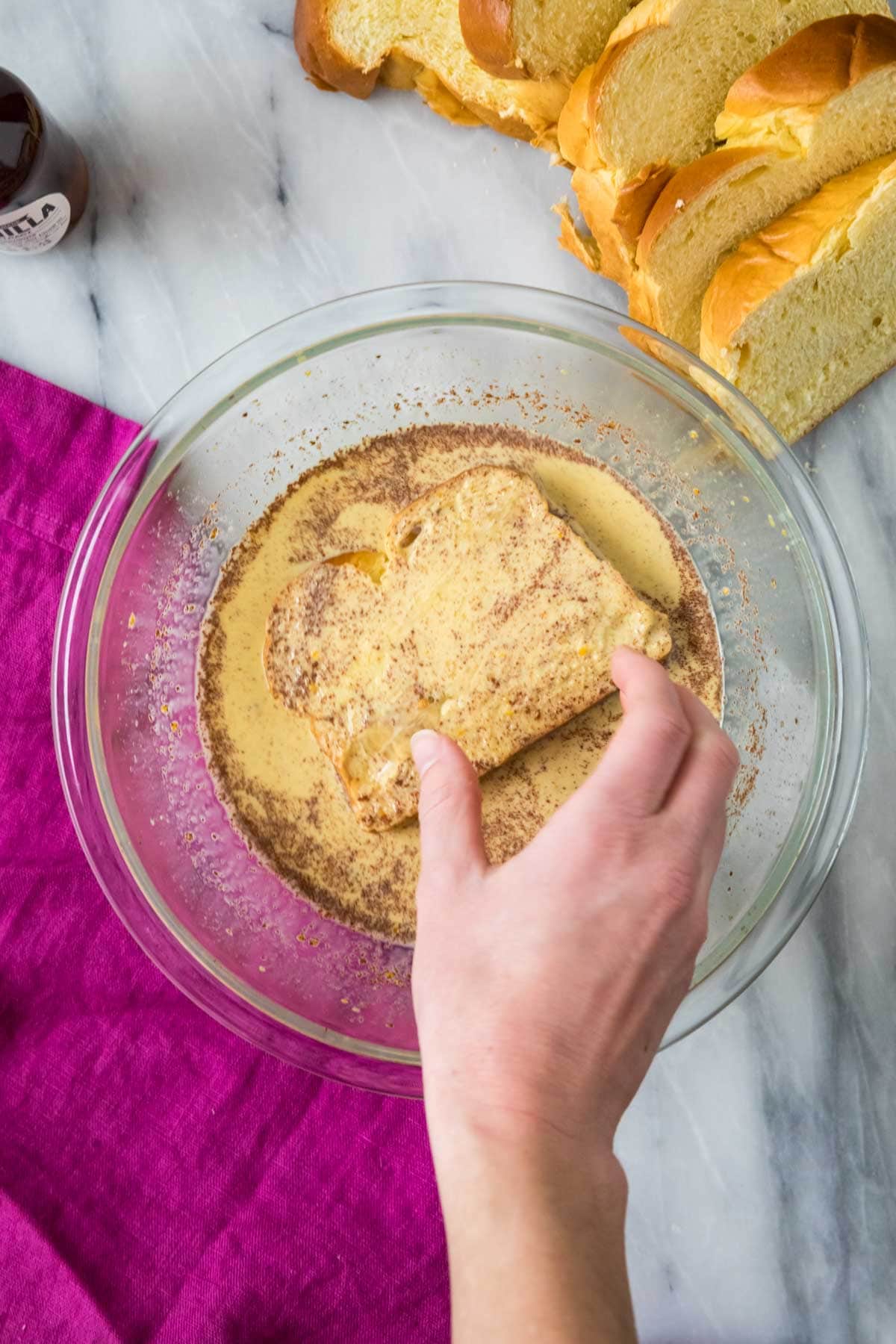
2. Dip a bread slice in your egg mixture and let soak for 4 seconds per side. This allows the custard to infuse without making the bread soggy.
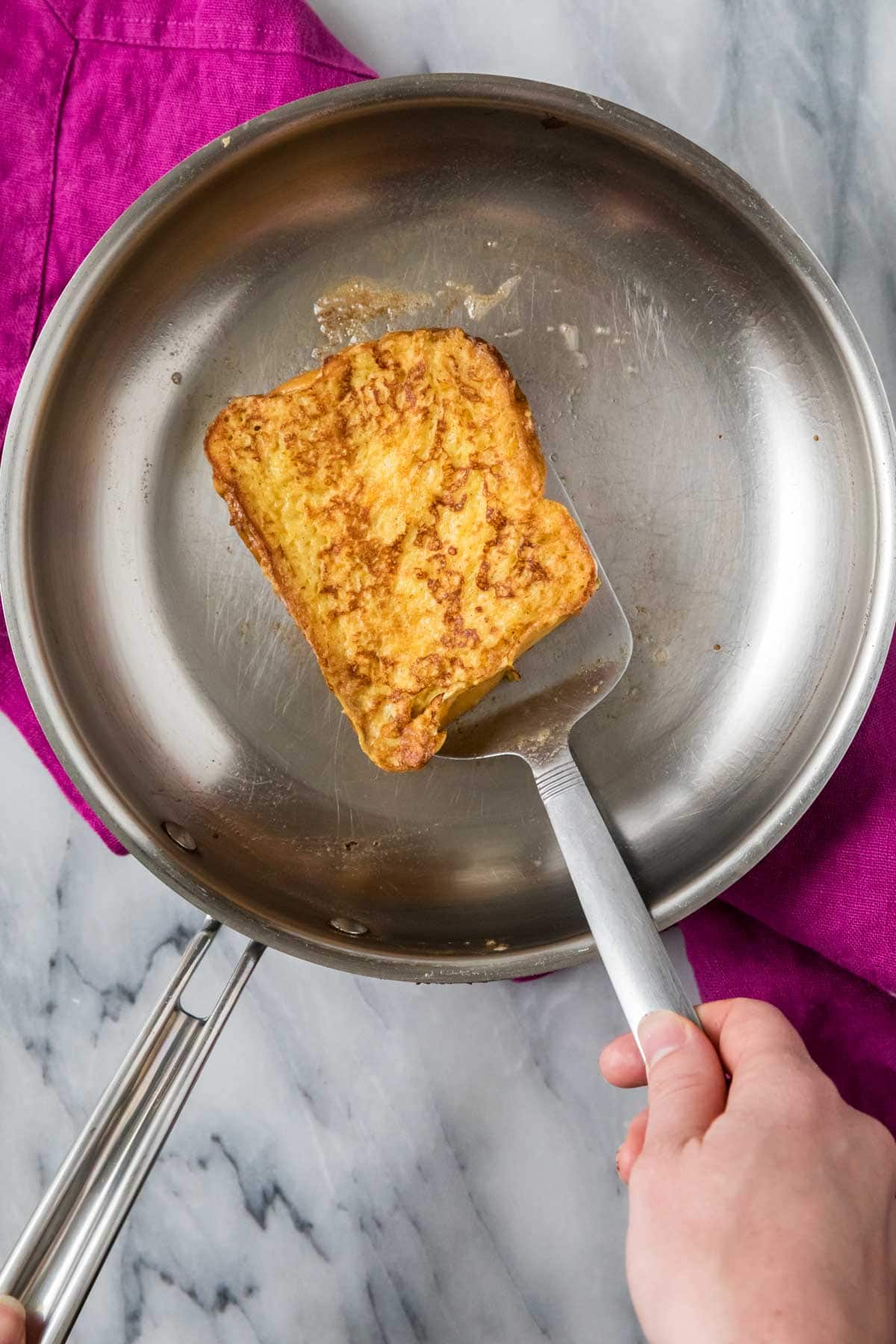
- Cook until golden brown on both sides. Wipe out the pan, then repeat with your remaining slices, adding a small amount of butter to the pan in between each addition.
SAM’S TIP: I include instructions for keeping your French toast warm while you finish cooking in the recipe notes below. If your oven has a “keep warm” setting, that’s a great option too!

Frequently Asked Questions
If you’re getting soggy slices, it could be that you’re simply soaking your brioche too long (it shouldn’t seem overly soggy or limp or be falling apart after you’ve dipped it in the custard), but typically this is most likely an issue with cooking temperature.
Heat that’s too high will cook the bread too fast on the outside, leaving the inside underbaked. Likewise, heat that’s too low will take too long to penetrate through the toast, also leaving it underbaked at the center.
Use your ears to test if your pan is hot enough; you should hear a gentle, but present sizzle once the bread touches the pan. If it doesn’t sizzle at all, then your pan isn’t hot enough or needs more time to warm. If it splatters/sizzles or becomes smoky, then your heat is too high!
Stale bread actually works great for French toast (and bread pudding too!); however, it’s not a necessity here. I get great results using both fresh and several-day-old brioche.
You could, but this recipe is really designed for an enriched bread like brioche or challah. I’d recommend my easy french toast recipe instead if you plan to use a thinner sandwich bread.
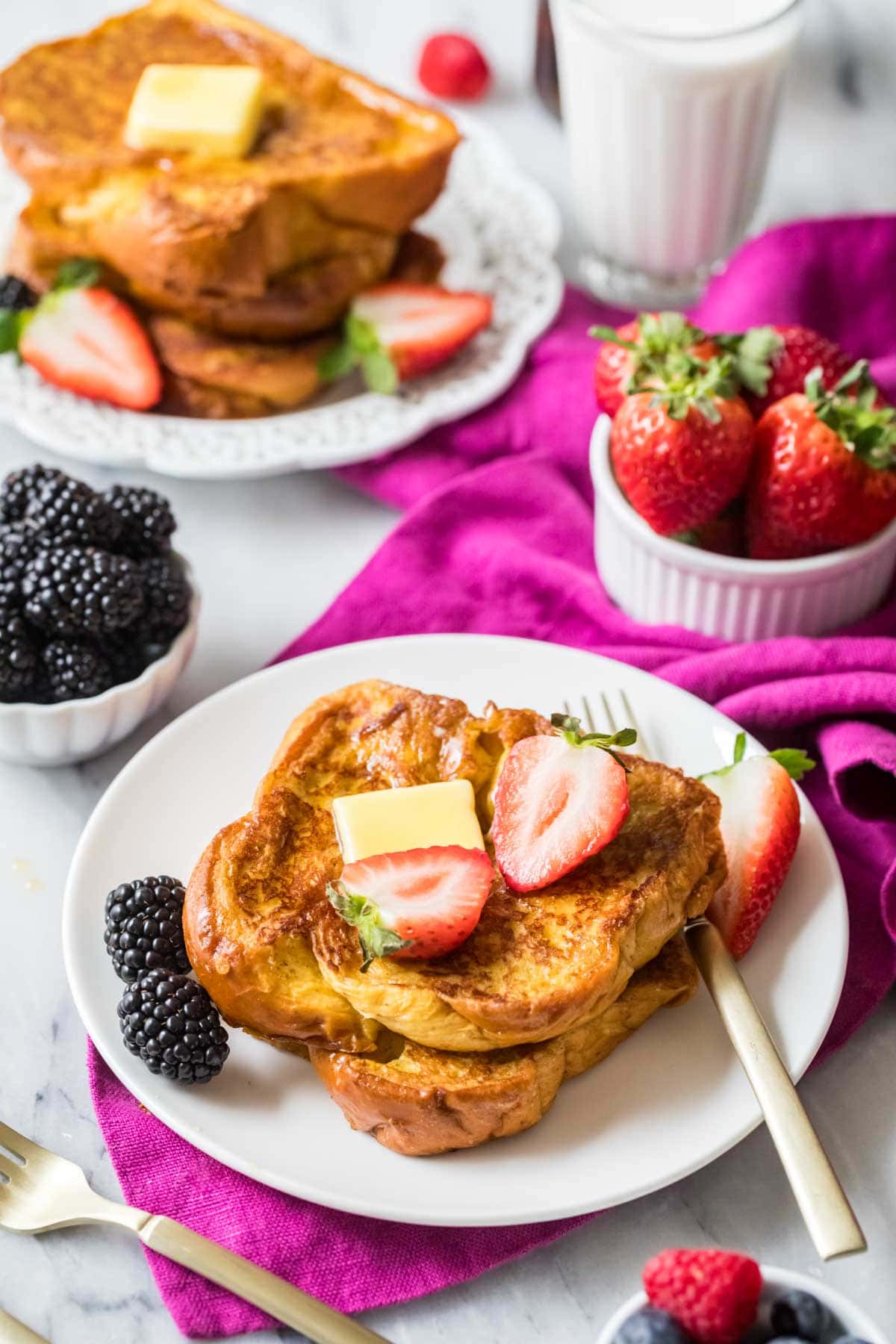
How do you like to top your French toast? We like maple syrup and butter around here 😋
Enjoy!
Let’s bake together! Subscribe to my newsletter to be notified of all the newest recipes, and find my free recipe tutorials on YouTube 💜

Brioche French Toast
Elevate your breakfast game with this brioche French toast! This recipe feels and tastes fancy, but it’s just as easy as regular French toast. Don’t miss my secret ingredient for the BEST flavor!
Print
Pin
Rate
Servings: 7 1″ slices
Calories: 271kcal
Prevent your screen from going dark
Instructions
-
In a large mixing bowl, whisk together eggs, half and half, sugar, vanilla, orange zest, cinamon, and salt until completely combined. Set aside.
4 large eggs, ¾ cup (180 ml) half and half, 1 Tablespoon granulated sugar, 1 teaspoon orange zest, 1 teaspoon ground cinnamon, ½ teaspoon vanilla extract, ⅛ heaping teaspoon table salt
-
Heat a skillet over medium heat. Once warm, add a Tablespoon of butter and swirl in the pan until melted.
3 Tablespoons (42 g) unsalted butter
-
As butter melts, give the egg mixture another quick stir then dip one slice of brioche bread into the egg mixture. Hold it in the mixture for 4 seconds, then flip over and dip the other side for another 4 seconds. You want the bread to absorb the liquid, but not sit in it so long that it becomes soggy.
7 slices brioche bread
-
Place bread in heated skillet and cook until golden-brown, about 2-3 minutes, then flip and cook opposite side until golden. Note: The pan should lightly sizzle when you add the bread, if it doesn’t then the pan is not hot enough and may not cook properly.
-
After cooking each slice, carefully remove to a plate (see note for tips to keep warm while you cook all the slices) and gently wipe out the skillet with a paper towel (be careful not to touch the pan and burn yourself!).
-
Add another small pat of butter to the skillet and allow to melt as you dip the next slice of brioche. Add to the pan and cook as indicated above. Repeat for each slice of brioche.
-
Serve immediately with desired toppings (we like butter and maple syrup!).
Additional butter
Notes
Keep warm
For best results (and due to skillet space) I typically only cook 1 or 2 slices of French toast at a time. To keep the cooked slices warm while I’m cooking the rest, I’ll line a baking tray with parchment paper and lay the cooked slices in an even layer on the pan and place in a warm oven (I do 100F/40C, you don’t want the oven to be too hot or it will dry out the toast!) as I cook the additional slices.
Storing
French toast is best enjoyed immediately after it is served. However, leftover slices can be stored in an airtight container in a single layer in the refrigerator for up to two days and reheated in a 375F (190C) oven until warmed through. Slices may also be frozen in an even layer on a baking sheet for 15-20 minutes (until firm) then transferred to an airtight container like a zipper plastic bag and frozen for up to several months.
Nutrition
Serving: 11″ slice | Calories: 271kcal | Carbohydrates: 19g | Protein: 8g | Fat: 18g | Saturated Fat: 10g | Polyunsaturated Fat: 1g | Monounsaturated Fat: 3g | Trans Fat: 0.2g | Cholesterol: 175mg | Sodium: 212mg | Potassium: 73mg | Fiber: 0.2g | Sugar: 3g | Vitamin A: 679IU | Vitamin C: 1mg | Calcium: 67mg | Iron: 1mg
Nutritional information is based on third-party calculations and should be considered an estimate only. Actual nutritional content will vary based upon brands used, measuring methods, cooking method, portion sizes, and more.
Related Recipes

